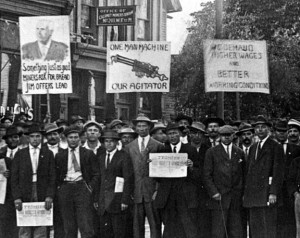 A hundred years ago yesterday, on December 10th, 1913, the operators of the Calumet and Hecla Mine and members of the Citizens Alliance announced that all representatives of organized labor from outside the state had just “twenty four hours to leave. If they fail to do so they will be sent out of the district in a manner most convenient and effective.”
A hundred years ago yesterday, on December 10th, 1913, the operators of the Calumet and Hecla Mine and members of the Citizens Alliance announced that all representatives of organized labor from outside the state had just “twenty four hours to leave. If they fail to do so they will be sent out of the district in a manner most convenient and effective.”
This wasn’t an idle threat.
Just days before, on December 7th, three men had been shot and killed at a boarding house in Painesdale. A thirteen-year-old girl was wounded in the melee. Kenneth Nicholson, who was four years old at the time and would later write an account of the shooting, called the Painesdale murders an “act of terrorism, brought on by an ongoing strike at that time.” It only “succeeded,” he went on to say, “in losing for the strikers whatever public support they might have had.”
Most of the blame for the violence of the strike and all the trouble in Calumet did not, however, fall on the striking miners, but on the outsiders who had stirred them up. A headline in the Mining Gazette on December 8th demanded that “foreign agitators” be “driven from the district at once.” The specter of “foreign” agitation – “fiery speakers” and “oily-tongued orators” who “goaded” the miners to strike — loomed large over the range. At a Citizens Alliance meeting, A. E. Petermann put it this way:
Six months ago people of the copper country of Michigan would have been proud to say in the outside world, I am from the copper country of Michigan. We had a happy community. There were no murders, no disorder, no lawlessness. See what has happened in four months? It has been brought about by whom? By men who have been hired to come here and spread their poisonous slime.
The Western Federation’s Charles Moyer – who just days after the Italian Hall disaster would himself be subject to convenient and effective removal, shot through the arm and hustled on to a Chicago-bound train – was clearly aware public opinion in Calumet had turned against him and other outside organizers. He telegrammed his alarm to the American Federation of Labor. AFL officials brought the telegram to President Wilson’s attention, “so the constitutional right of the labor representatives may be protected.”
On the Copper Range, Judge O’Brien granted a writ of injunction, “restraining members of the Citizens Alliance from interfering with or molesting, by threats or intimidation,” members of the Western Federation of Miners. “Stop and think,” Petermann urged members of the Citizens Alliance. “You can’t afford to have any blood on your hands.”
Five months into the strike, the hope remained that if troublemakers from outside the district could just be sent packing, people would have a chance to settle down. “Wise counsel is prevailing,” wrote a local newspaper editor, as late as December 20th; “conservative citizens are playing a major part toward bringing the struggle to an end.” If people could just come together without outside interference, went this line of popular argument, the community might recover its balance, and find a way out of the mess those outside men had made. Everybody could be happy again.
